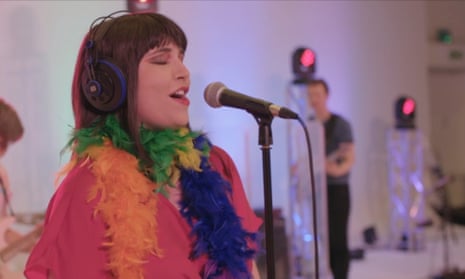Two decades ago, digital technology pulled the record business inside out, a shock from which it has only recently recovered. But in 2020 it is helping, at least partially, to remedy a live business obliterated by coronavirus cancellations.
Early in the pandemic, the likes of Twitch, YouTube, Instagram, TikTok and Facebook filled a gap with their livestreaming capabilities. Since then, dozens of new companies have launched with a streaming-specific remit – some taking a more egalitarian and ethical approach than the tech giants – while other event companies, who until recently were dedicated to real world gigs, are offering performers and fans the option to participate in pay-per-view livestreams.
“Before lockdown, we couldn’t have cared less about livestreaming,” says Phil Hutcheon, founder and CEO of ticketing app Dice. Watching “boring” livestreams on Instagram spurred him to set up a new team to launch Dice TV – Scottish superstar Lewis Capaldi was the first act to use it, charging £5 a head; acts can now sell merchandise alongside their streamed shows. “Selling 100 T-shirts at £30 a pop as they are limited edition – that’s their lifesaver,” says Hutcheon.

Some acts have reaped serious money from ticketed livestreams: Pollstar reports Laura Marling sold 4,500 (UK) tickets at £12 each for her show at London’s Union Chapel in June; YouTube says Japanese artist Reol made $130,000 from a livestream on its platform in August; and BTS’s management company Big Hit said they had 756,000 fans watch their Bang Bang Con live stream in June, each paying between 29,000 won (£19.41) and 39,000 won (£26.10), meaning a minimum gross of £14.6m.
These well-known artists are, however, among the tiny percentage of acts who can even hope to start making up for the dramatic shortfall they have suffered this year. To help smaller acts and venues, Andrea Cockerton of immersive live show production company We Are Sound is launching DIUO later in October. The platform will stream one-off concerts on a pay-per-view basis, as well as allow acts to set up their own subscription-based channels to host regular events. Cockerton says she does not want the entire platform to run on subscriptions: “That is what Spotify does, and we all know how that works out for the majority of artists.”

DIUO takes what Cockerton calls an “ethical approach to doing business” whereby 10% of all revenues is paid out in grants to road crew, sound engineers and others whose entire livelihood has gone and for whom there is minimal, if any, financial help coming from the UK government. “We’re putting our money where our mouth is,” Cockerton says, giving the first 100 bands who stream with DIUO a stake in a 10% portion of the company.
Artists staging DIUO shows take the lion’s share of revenue and can draw on in-house production and marketing expertise. Cockerton wants them to use small venues to stage their performances, which in turn will receive a room-hire fee and provide jobs for out-of-work crew. She estimates that acts need to sell around 400 tickets to cover costs, a figure she considers viable for smaller artists. “The only way through this is to innovate and do something differently,” she says.
Also attempting to innovate in this space is Oda. Founded in 2016 as a speaker company, its latest offering is festival-style curated programming whereby fans enjoy live performances beamed directly to Oda’s bespoke connected speakers, sold for $299 and supplemented by a $79 (£60) subscription fee every three months.
Oda was in part set up to help Phil Elverum (AKA Mount Eerie) play live without having to physically tour, which became difficult after his wife Geneviève Castrée died in 2016 and he was left to care for their infant daughter. He likes the fact Oda is audio-only as he feels video streams are incompatible with how he works. “To me, live performance is about this exchange between two or more people in a real space,” he says. Video streaming, he says, “seems like it was trying to simulate something from the past in a diminished form”.

With Ann Peebles and Don Bryant among the artists programmed for Oda’s launch, the focus is on less obvious artists, creating unique listener experiences: “sunset sessions” throughout the week and more concerted weekend events including music, readings and talks. “At the end you feel you’ve spent the weekend with an artist and that you now know them well,” says Oda co-founder Nick Dangerfield. He adds that acts can expect to generate $7,000-$30,000 (£5,300-£23,000) per weekend since making the experience audio-only lowers production costs. “What is important is that our platform is as inclusive as possible and that everyone is welcome,” he says.
Gig deprivation has spurred a burning desire for a return to live music. Dice is responsible for ticketing the 2021 Primavera festival – this year’s, like most festivals, was cancelled. Despite no guarantees about the viability of music festivals next year, the Barcelona weekender is already sold out and Hutcheon says there are “tens of thousands” of people on the waiting list for tickets.
In the interim, streaming is the only viable option for audiences stuck at home pining for live music. Although Nick Cave’s Idiot Prayer concert, streamed live from Alexandra Palace in July, will receive a cinematic release in November, Hutcheon argues that having streams that exist in that moment and then vanish is the best way to create a sense of occasion, as diminished as that might be compared to the real thing.
“One of the things that you get from live shows is scarcity,” he says. “Watching it at that moment when people are watching actually enhances the experience. This whole thing has been a fascinating study in human behaviour.”

Comments (…)
Sign in or create your Guardian account to join the discussion